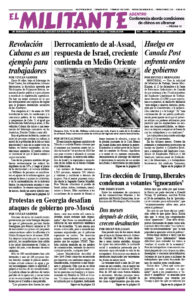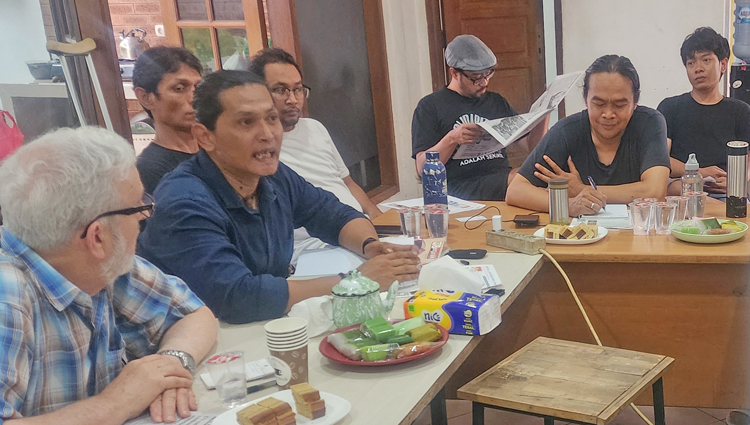JAKARTA, Indonesia — Thousands of workers joined demonstrations here in Indonesia’s capital city Oct. 24 and across the country in the following days. The actions protested anti-labor measures in the Omnibus Law imposed in 2020 by former President Joko Widodo as part of the capitalist rulers’ drive to expand economic development. Indonesia is a country of some 284 million people, with a workforce over 146 million.
Widodo claimed the law would create jobs by cutting red tape, easing restrictions on foreign investment and improving labor “competitiveness” — code words for deepening the exploitation of working people.
Hundreds of thousands of workers and students protested the introduction of the law in 2020, including a three-day national strike called by the country’s main trade union federations.
The law superseded more than 70 laws on the books, including ones that provided some protection to wage workers. It made it easier for bosses to fire workers and reduced the benefits bosses had to provide to workers, including severance pay.
Before May Day demonstrations this year, Said Iqbal, chairman of the Indonesian Trade Union Confederation (KSPI), said that since the introduction of the Omnibus Law many companies have laid off permanent employees and replaced them with contract workers at lower wages. The KSPI, one of the main union federations, has over 2 million members.
In a series of actions in October, the unions called on the government of President Prabowo Subianto to grant an 8% to 10% increase in the minimum wage to compensate for rising prices, as well as to restore legal protections for workers, abolish outsourcing and revoke the Omnibus Law. Subianto ran for office as a populist. He had previously served as a general under the brutal Suharto dictatorship, which ruled Indonesia from the mid-1960s until 1998, when it was brought down by massive countrywide protests.
Workers rallied again Oct. 31 in front of the Constitutional Court here. The action coincided with the court’s review of the Omnibus Law. The court granted 21 out of 71 petition points filed by unions against the law and ordered the government to replace it with a new one within two years.
The ruling limits the terms on contract work and provides for two rest days a week. It also stipulates the minimum wage system requirements must fulfill the reasonable needs of workers and their families, without specifying what that should be.
Subianto responded by announcing the government would increase the minimum wage by 6.5%, and the KSPI cancelled strikes it had been planning.
Union movement needs unity
These Militant correspondents met with representatives of the Confederation of Indonesia People’s Movement (KPRI) in Jakarta. They work with a number of small unions and with workers in the informal sector, who make up about 70% of the Indonesian workforce. They are not unionized.
Workers in the informal sector either don’t have written contracts with their employers or are self-employed. They range from street vendors and agricultural workers to manual laborers in manufacturing and construction. They’re paid low wages, toil long hours and have limited access to social protections or health care.
“Less than 3% of the workforce are union members, about 4 million workers,” KPRI General Secretary Anwar Sastro Ma’ruf said. “Unemployment stands at 7 million but this only includes those who are considered to be ‘looking for work.’”
There are many different unions and union federations, most connected with different political parties. “In Indonesia, the unions are fragmented. The challenge is how to bring unification,” Rizki Estrada said. “The bosses use union-busting tactics against the independent trade unions.”
“A lot of industry, especially in manufacturing and food, is leaving Jakarta,” Ma’ruf said, going to parts of the country where labor costs are lower. “This poses the need to spread organizing to the regions.”
Farmers’ struggles
We also visited the offices of Bina Desa, a group that campaigns on behalf of small farmers and fishermen. They also promote the use of “natural” farming methods.
John Sinulingga, an editor at Bina Desa, explained how big estates take land from small farmers. The land gets divided up among family members and the plots get smaller. These measures deepen poverty in the countryside. Many youth are leaving for the cities, a large proportion becoming informal workers.
Farmers also face the environmental and social impact of multibillion-dollar Chinese projects and other foreign investments. The large-scale mining operations funded by China, such as nickel extraction, have caused deforestation, water pollution and the displacement of local communities.
Hundreds of farmers took part in a “National Farmers Day” protest in Jakarta Sept. 24, demanding redistribution of land. Small farmers have fought for agrarian law reform going back to the struggle for independence from the Dutch, which wasn’t won until after World War II.
Indonesian Farmers Union Chair Henry Saragih told the media there that rice fields have decreased drastically in the last decade, increasing the number of subsistence farmers. “There has been an increase of 2 million farmers who used to have enough land for farming but now do not,” he said. Small farmers can barely harvest enough to survive.
Saragih also criticized large corporations’ growing control of agricultural land that the government promotes as “National Strategic Projects.” As these projects expand, Saragih said, “agrarian conflicts are increasing.”


